Future Mindset and Challenge: AI, IoT and Smart Cities
VerifiedAdded on 2022/09/15
|6
|1039
|22
Homework Assignment
AI Summary
This assignment explores the transformative impact of artificial intelligence (AI) and the Internet of Things (IoT) on future challenges, particularly within the context of smart cities. The paper addresses major societal issues such as the need for clean energy, increasing pollution, and mobility challenges arising from rapid urbanization. It highlights the potential of AI and IoT to address these issues through technological innovations, including smart grids, automated asset tracking, and AI-powered customer services. The assignment emphasizes the development of sustainable energy sources, efficient waste management, and improved urban mobility. The paper also discusses the evolution of smart cities, the use of AI for data processing, and the role of IoT-enabled devices in communication and process improvement. The conclusion highlights the significant impact of these technologies on consumers, industries, and society, and their potential for continued growth and positive societal impact.
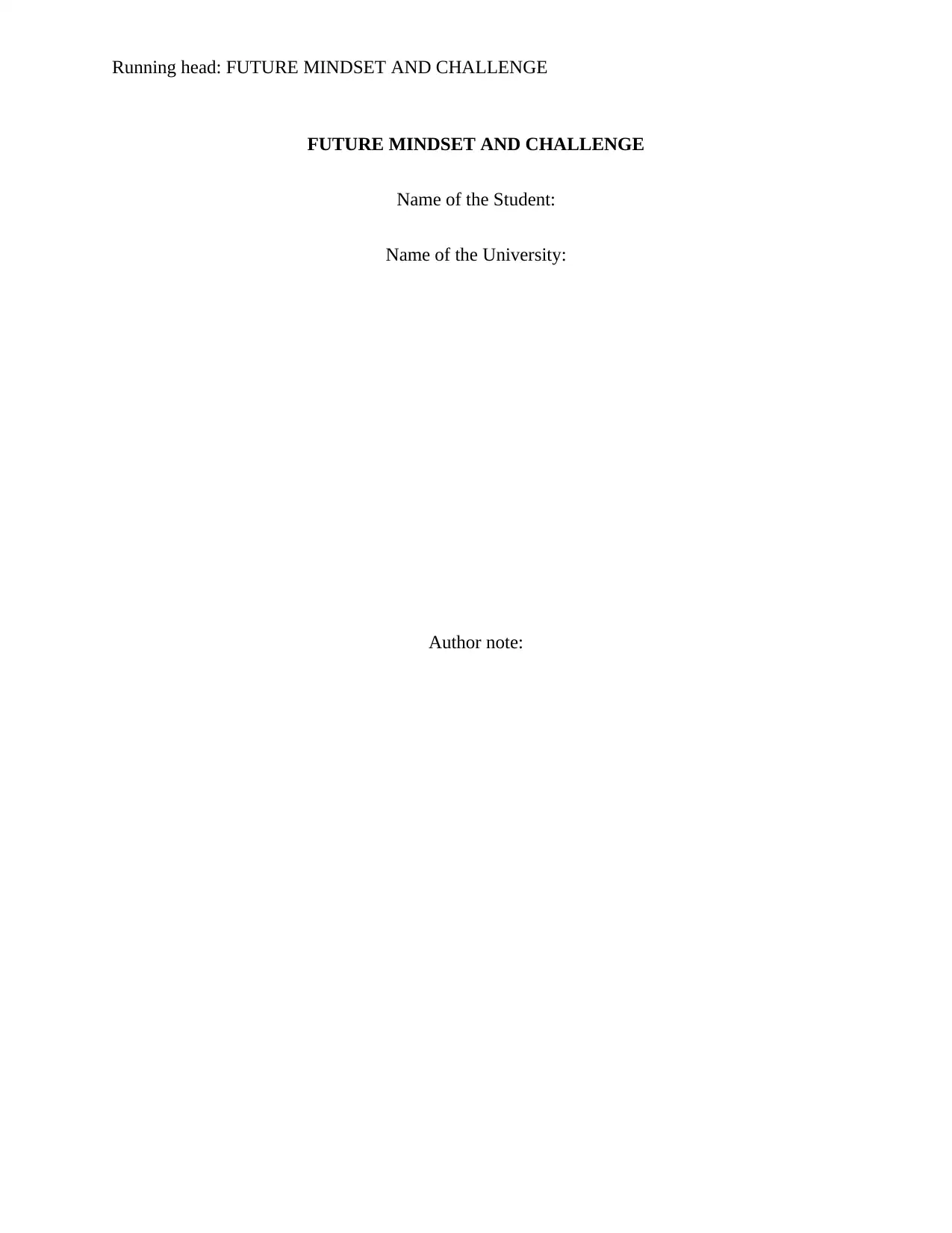
Running head: FUTURE MINDSET AND CHALLENGE
FUTURE MINDSET AND CHALLENGE
Name of the Student:
Name of the University:
Author note:
FUTURE MINDSET AND CHALLENGE
Name of the Student:
Name of the University:
Author note:
Paraphrase This Document
Need a fresh take? Get an instant paraphrase of this document with our AI Paraphraser
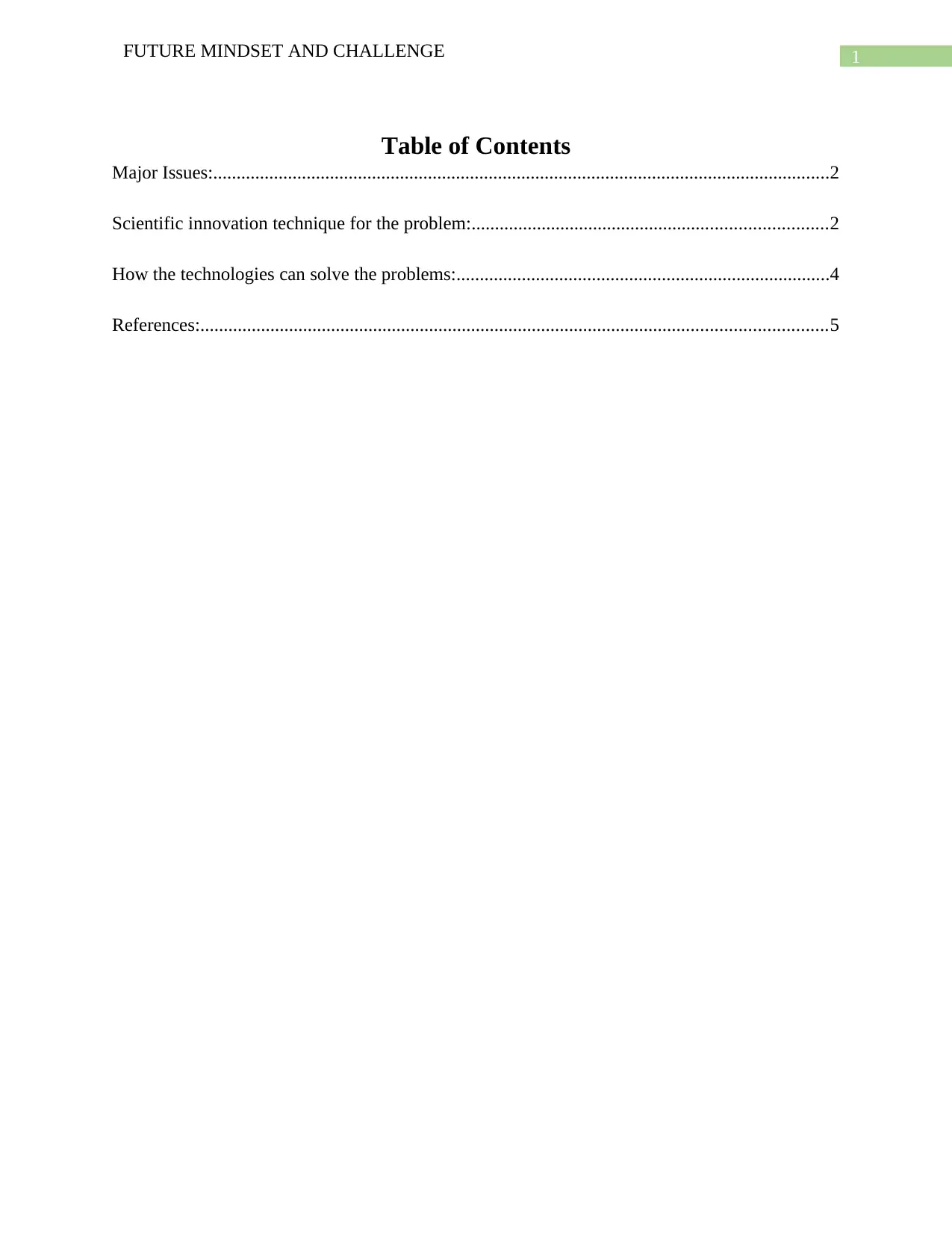
1FUTURE MINDSET AND CHALLENGE
Table of Contents
Major Issues:....................................................................................................................................2
Scientific innovation technique for the problem:............................................................................2
How the technologies can solve the problems:................................................................................4
References:......................................................................................................................................5
Table of Contents
Major Issues:....................................................................................................................................2
Scientific innovation technique for the problem:............................................................................2
How the technologies can solve the problems:................................................................................4
References:......................................................................................................................................5
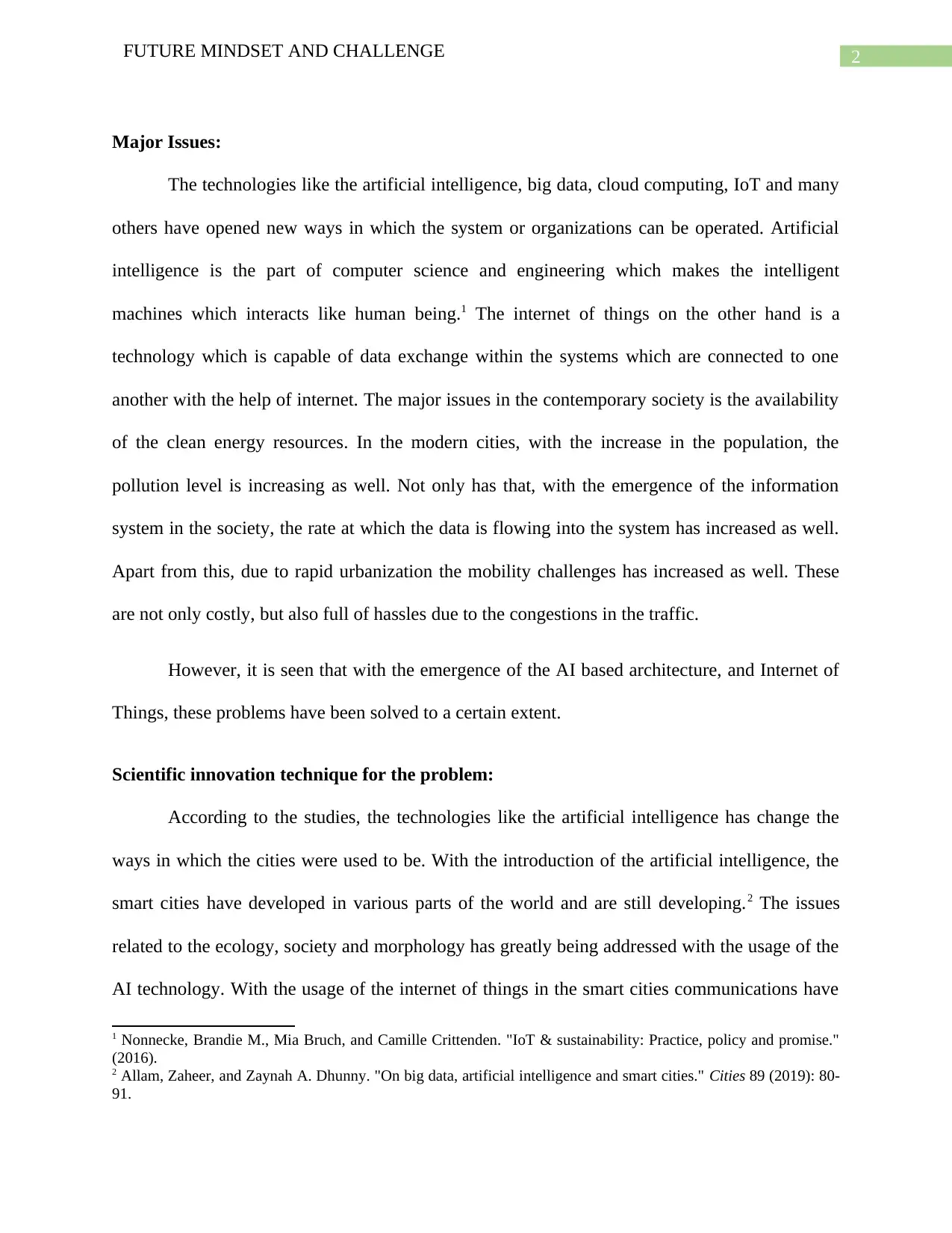
2FUTURE MINDSET AND CHALLENGE
Major Issues:
The technologies like the artificial intelligence, big data, cloud computing, IoT and many
others have opened new ways in which the system or organizations can be operated. Artificial
intelligence is the part of computer science and engineering which makes the intelligent
machines which interacts like human being.1 The internet of things on the other hand is a
technology which is capable of data exchange within the systems which are connected to one
another with the help of internet. The major issues in the contemporary society is the availability
of the clean energy resources. In the modern cities, with the increase in the population, the
pollution level is increasing as well. Not only has that, with the emergence of the information
system in the society, the rate at which the data is flowing into the system has increased as well.
Apart from this, due to rapid urbanization the mobility challenges has increased as well. These
are not only costly, but also full of hassles due to the congestions in the traffic.
However, it is seen that with the emergence of the AI based architecture, and Internet of
Things, these problems have been solved to a certain extent.
Scientific innovation technique for the problem:
According to the studies, the technologies like the artificial intelligence has change the
ways in which the cities were used to be. With the introduction of the artificial intelligence, the
smart cities have developed in various parts of the world and are still developing.2 The issues
related to the ecology, society and morphology has greatly being addressed with the usage of the
AI technology. With the usage of the internet of things in the smart cities communications have
1 Nonnecke, Brandie M., Mia Bruch, and Camille Crittenden. "IoT & sustainability: Practice, policy and promise."
(2016).
2 Allam, Zaheer, and Zaynah A. Dhunny. "On big data, artificial intelligence and smart cities." Cities 89 (2019): 80-
91.
Major Issues:
The technologies like the artificial intelligence, big data, cloud computing, IoT and many
others have opened new ways in which the system or organizations can be operated. Artificial
intelligence is the part of computer science and engineering which makes the intelligent
machines which interacts like human being.1 The internet of things on the other hand is a
technology which is capable of data exchange within the systems which are connected to one
another with the help of internet. The major issues in the contemporary society is the availability
of the clean energy resources. In the modern cities, with the increase in the population, the
pollution level is increasing as well. Not only has that, with the emergence of the information
system in the society, the rate at which the data is flowing into the system has increased as well.
Apart from this, due to rapid urbanization the mobility challenges has increased as well. These
are not only costly, but also full of hassles due to the congestions in the traffic.
However, it is seen that with the emergence of the AI based architecture, and Internet of
Things, these problems have been solved to a certain extent.
Scientific innovation technique for the problem:
According to the studies, the technologies like the artificial intelligence has change the
ways in which the cities were used to be. With the introduction of the artificial intelligence, the
smart cities have developed in various parts of the world and are still developing.2 The issues
related to the ecology, society and morphology has greatly being addressed with the usage of the
AI technology. With the usage of the internet of things in the smart cities communications have
1 Nonnecke, Brandie M., Mia Bruch, and Camille Crittenden. "IoT & sustainability: Practice, policy and promise."
(2016).
2 Allam, Zaheer, and Zaynah A. Dhunny. "On big data, artificial intelligence and smart cities." Cities 89 (2019): 80-
91.
⊘ This is a preview!⊘
Do you want full access?
Subscribe today to unlock all pages.

Trusted by 1+ million students worldwide
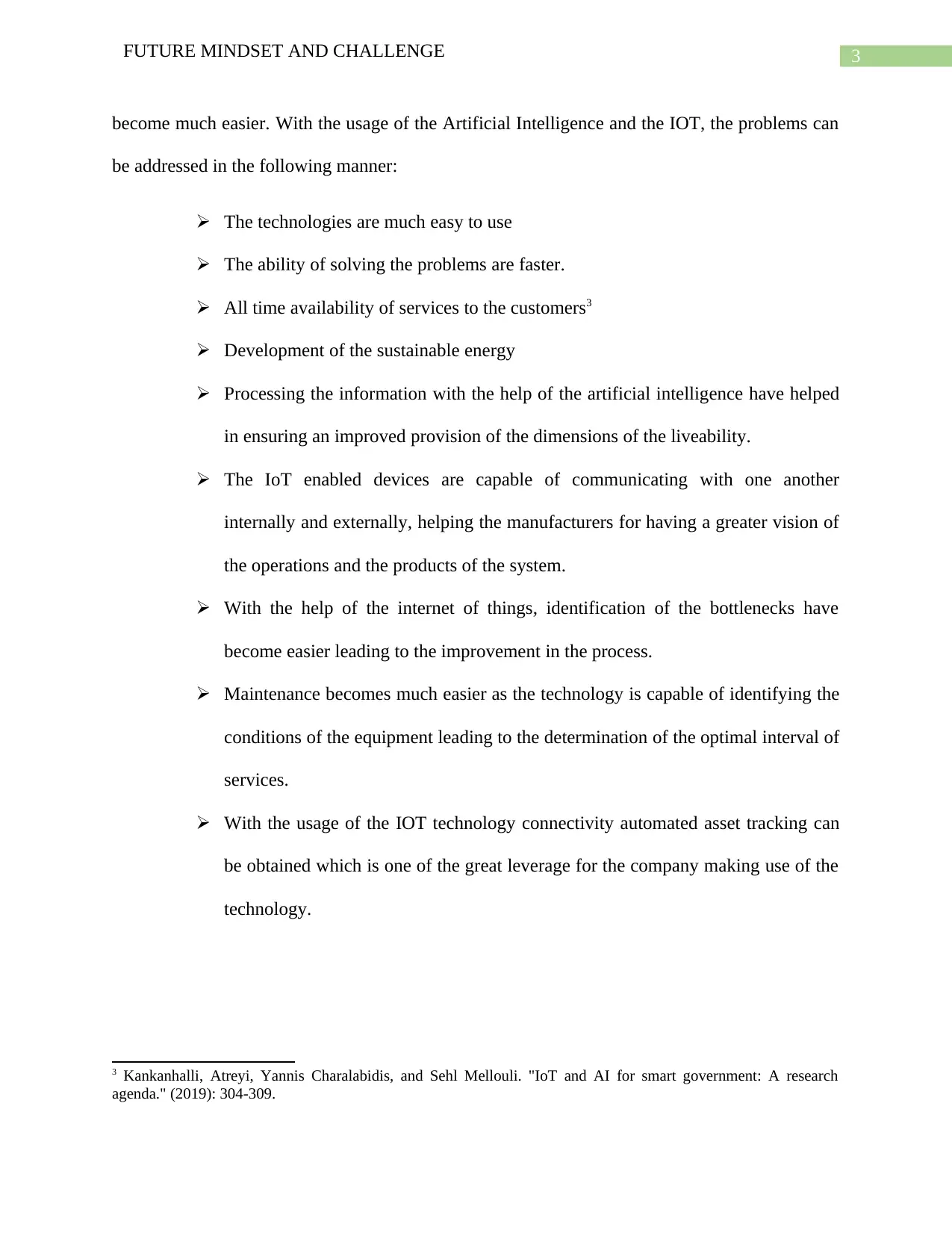
3FUTURE MINDSET AND CHALLENGE
become much easier. With the usage of the Artificial Intelligence and the IOT, the problems can
be addressed in the following manner:
The technologies are much easy to use
The ability of solving the problems are faster.
All time availability of services to the customers3
Development of the sustainable energy
Processing the information with the help of the artificial intelligence have helped
in ensuring an improved provision of the dimensions of the liveability.
The IoT enabled devices are capable of communicating with one another
internally and externally, helping the manufacturers for having a greater vision of
the operations and the products of the system.
With the help of the internet of things, identification of the bottlenecks have
become easier leading to the improvement in the process.
Maintenance becomes much easier as the technology is capable of identifying the
conditions of the equipment leading to the determination of the optimal interval of
services.
With the usage of the IOT technology connectivity automated asset tracking can
be obtained which is one of the great leverage for the company making use of the
technology.
3 Kankanhalli, Atreyi, Yannis Charalabidis, and Sehl Mellouli. "IoT and AI for smart government: A research
agenda." (2019): 304-309.
become much easier. With the usage of the Artificial Intelligence and the IOT, the problems can
be addressed in the following manner:
The technologies are much easy to use
The ability of solving the problems are faster.
All time availability of services to the customers3
Development of the sustainable energy
Processing the information with the help of the artificial intelligence have helped
in ensuring an improved provision of the dimensions of the liveability.
The IoT enabled devices are capable of communicating with one another
internally and externally, helping the manufacturers for having a greater vision of
the operations and the products of the system.
With the help of the internet of things, identification of the bottlenecks have
become easier leading to the improvement in the process.
Maintenance becomes much easier as the technology is capable of identifying the
conditions of the equipment leading to the determination of the optimal interval of
services.
With the usage of the IOT technology connectivity automated asset tracking can
be obtained which is one of the great leverage for the company making use of the
technology.
3 Kankanhalli, Atreyi, Yannis Charalabidis, and Sehl Mellouli. "IoT and AI for smart government: A research
agenda." (2019): 304-309.
Paraphrase This Document
Need a fresh take? Get an instant paraphrase of this document with our AI Paraphraser
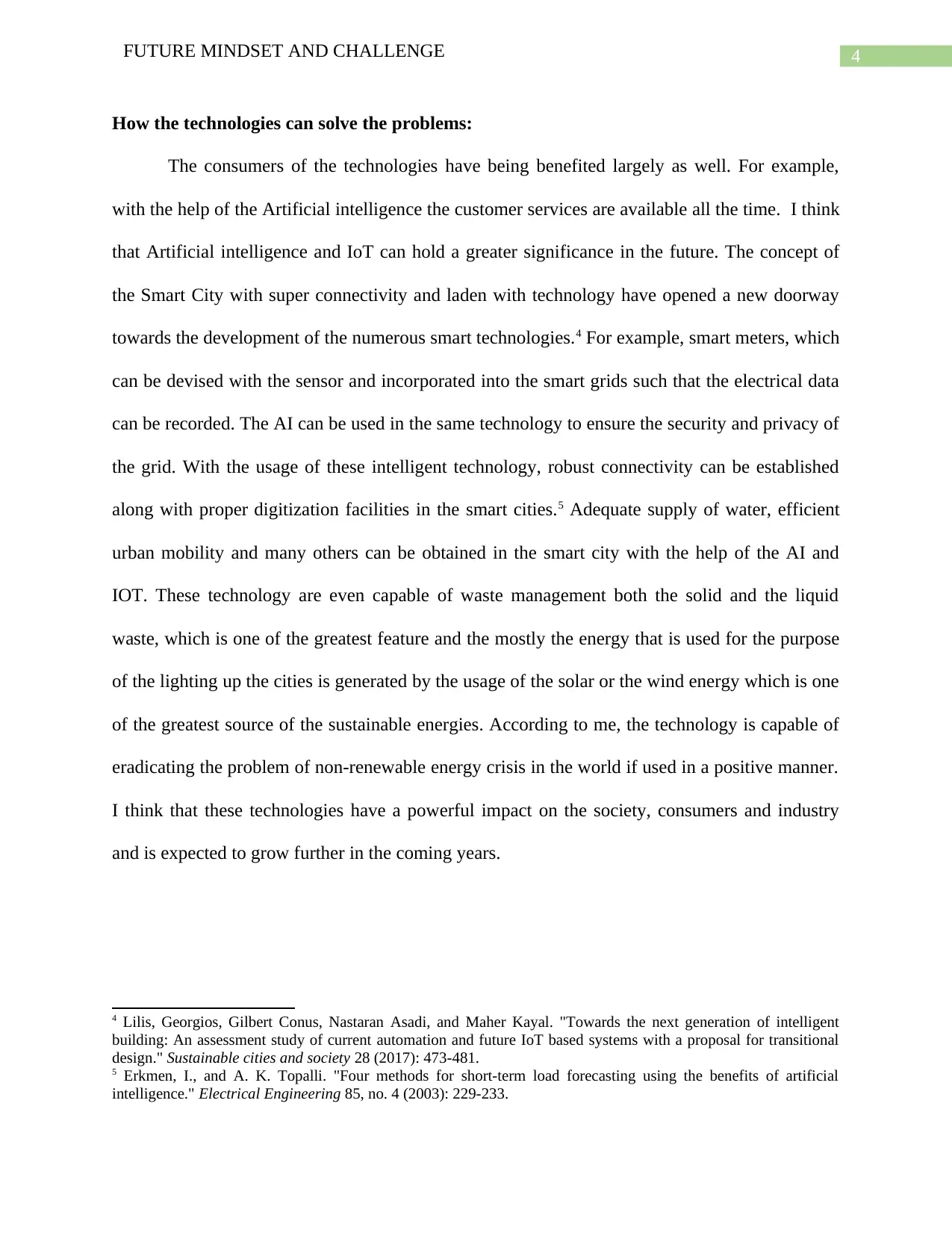
4FUTURE MINDSET AND CHALLENGE
How the technologies can solve the problems:
The consumers of the technologies have being benefited largely as well. For example,
with the help of the Artificial intelligence the customer services are available all the time. I think
that Artificial intelligence and IoT can hold a greater significance in the future. The concept of
the Smart City with super connectivity and laden with technology have opened a new doorway
towards the development of the numerous smart technologies.4 For example, smart meters, which
can be devised with the sensor and incorporated into the smart grids such that the electrical data
can be recorded. The AI can be used in the same technology to ensure the security and privacy of
the grid. With the usage of these intelligent technology, robust connectivity can be established
along with proper digitization facilities in the smart cities.5 Adequate supply of water, efficient
urban mobility and many others can be obtained in the smart city with the help of the AI and
IOT. These technology are even capable of waste management both the solid and the liquid
waste, which is one of the greatest feature and the mostly the energy that is used for the purpose
of the lighting up the cities is generated by the usage of the solar or the wind energy which is one
of the greatest source of the sustainable energies. According to me, the technology is capable of
eradicating the problem of non-renewable energy crisis in the world if used in a positive manner.
I think that these technologies have a powerful impact on the society, consumers and industry
and is expected to grow further in the coming years.
4 Lilis, Georgios, Gilbert Conus, Nastaran Asadi, and Maher Kayal. "Towards the next generation of intelligent
building: An assessment study of current automation and future IoT based systems with a proposal for transitional
design." Sustainable cities and society 28 (2017): 473-481.
5 Erkmen, I., and A. K. Topalli. "Four methods for short-term load forecasting using the benefits of artificial
intelligence." Electrical Engineering 85, no. 4 (2003): 229-233.
How the technologies can solve the problems:
The consumers of the technologies have being benefited largely as well. For example,
with the help of the Artificial intelligence the customer services are available all the time. I think
that Artificial intelligence and IoT can hold a greater significance in the future. The concept of
the Smart City with super connectivity and laden with technology have opened a new doorway
towards the development of the numerous smart technologies.4 For example, smart meters, which
can be devised with the sensor and incorporated into the smart grids such that the electrical data
can be recorded. The AI can be used in the same technology to ensure the security and privacy of
the grid. With the usage of these intelligent technology, robust connectivity can be established
along with proper digitization facilities in the smart cities.5 Adequate supply of water, efficient
urban mobility and many others can be obtained in the smart city with the help of the AI and
IOT. These technology are even capable of waste management both the solid and the liquid
waste, which is one of the greatest feature and the mostly the energy that is used for the purpose
of the lighting up the cities is generated by the usage of the solar or the wind energy which is one
of the greatest source of the sustainable energies. According to me, the technology is capable of
eradicating the problem of non-renewable energy crisis in the world if used in a positive manner.
I think that these technologies have a powerful impact on the society, consumers and industry
and is expected to grow further in the coming years.
4 Lilis, Georgios, Gilbert Conus, Nastaran Asadi, and Maher Kayal. "Towards the next generation of intelligent
building: An assessment study of current automation and future IoT based systems with a proposal for transitional
design." Sustainable cities and society 28 (2017): 473-481.
5 Erkmen, I., and A. K. Topalli. "Four methods for short-term load forecasting using the benefits of artificial
intelligence." Electrical Engineering 85, no. 4 (2003): 229-233.
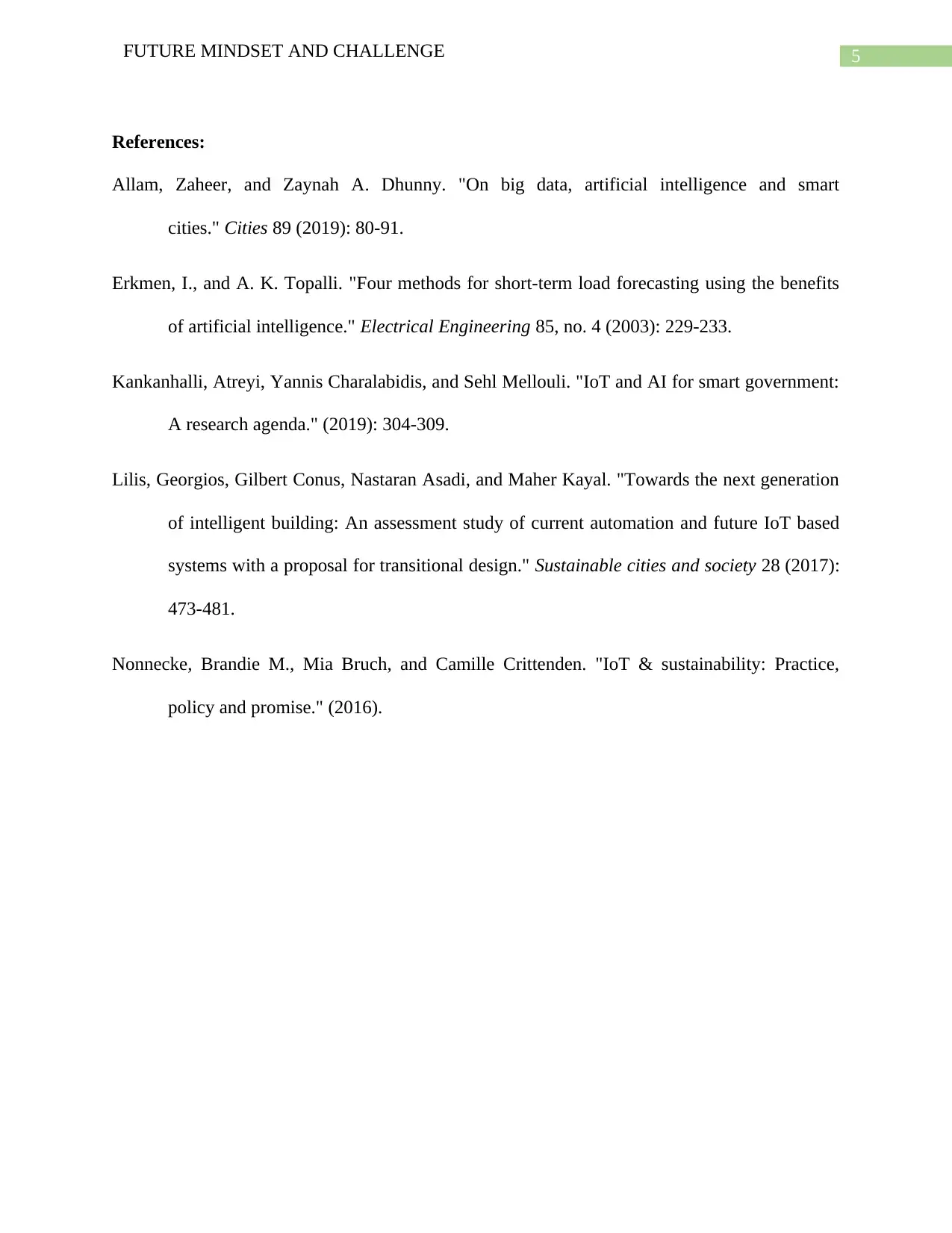
5FUTURE MINDSET AND CHALLENGE
References:
Allam, Zaheer, and Zaynah A. Dhunny. "On big data, artificial intelligence and smart
cities." Cities 89 (2019): 80-91.
Erkmen, I., and A. K. Topalli. "Four methods for short-term load forecasting using the benefits
of artificial intelligence." Electrical Engineering 85, no. 4 (2003): 229-233.
Kankanhalli, Atreyi, Yannis Charalabidis, and Sehl Mellouli. "IoT and AI for smart government:
A research agenda." (2019): 304-309.
Lilis, Georgios, Gilbert Conus, Nastaran Asadi, and Maher Kayal. "Towards the next generation
of intelligent building: An assessment study of current automation and future IoT based
systems with a proposal for transitional design." Sustainable cities and society 28 (2017):
473-481.
Nonnecke, Brandie M., Mia Bruch, and Camille Crittenden. "IoT & sustainability: Practice,
policy and promise." (2016).
References:
Allam, Zaheer, and Zaynah A. Dhunny. "On big data, artificial intelligence and smart
cities." Cities 89 (2019): 80-91.
Erkmen, I., and A. K. Topalli. "Four methods for short-term load forecasting using the benefits
of artificial intelligence." Electrical Engineering 85, no. 4 (2003): 229-233.
Kankanhalli, Atreyi, Yannis Charalabidis, and Sehl Mellouli. "IoT and AI for smart government:
A research agenda." (2019): 304-309.
Lilis, Georgios, Gilbert Conus, Nastaran Asadi, and Maher Kayal. "Towards the next generation
of intelligent building: An assessment study of current automation and future IoT based
systems with a proposal for transitional design." Sustainable cities and society 28 (2017):
473-481.
Nonnecke, Brandie M., Mia Bruch, and Camille Crittenden. "IoT & sustainability: Practice,
policy and promise." (2016).
⊘ This is a preview!⊘
Do you want full access?
Subscribe today to unlock all pages.

Trusted by 1+ million students worldwide
1 out of 6
Related Documents
Your All-in-One AI-Powered Toolkit for Academic Success.
+13062052269
info@desklib.com
Available 24*7 on WhatsApp / Email
![[object Object]](/_next/static/media/star-bottom.7253800d.svg)
Unlock your academic potential
Copyright © 2020–2026 A2Z Services. All Rights Reserved. Developed and managed by ZUCOL.




